Reflective Learning: Significance, Feedback, and Assessment Strategies
VerifiedAdded on 2023/06/08
|7
|2089
|211
Essay
AI Summary
This essay delves into the significance of reflective learning, emphasizing its role in developing critical thinking skills and enhancing future performance. It discusses how a reflective approach to feedback and feedforward can improve both summative and formative assessments. The essay demonstrates an understanding of Gibb's reflective cycle, outlining its stages and how they contribute to the improvement of feedback and feedforward strategies. The main body explores the concept of reflection, its importance for students, and the application of Gibb's model, including description, feelings, evaluation, analysis, conclusion, and action plan stages. It also examines the role of feedback and feedforward in promoting personal and professional growth, and how it contributes to the improvement of assessment processes. The essay concludes by summarizing the key insights and emphasizing the importance of reflective learning and feedback for effective learning and assessment.
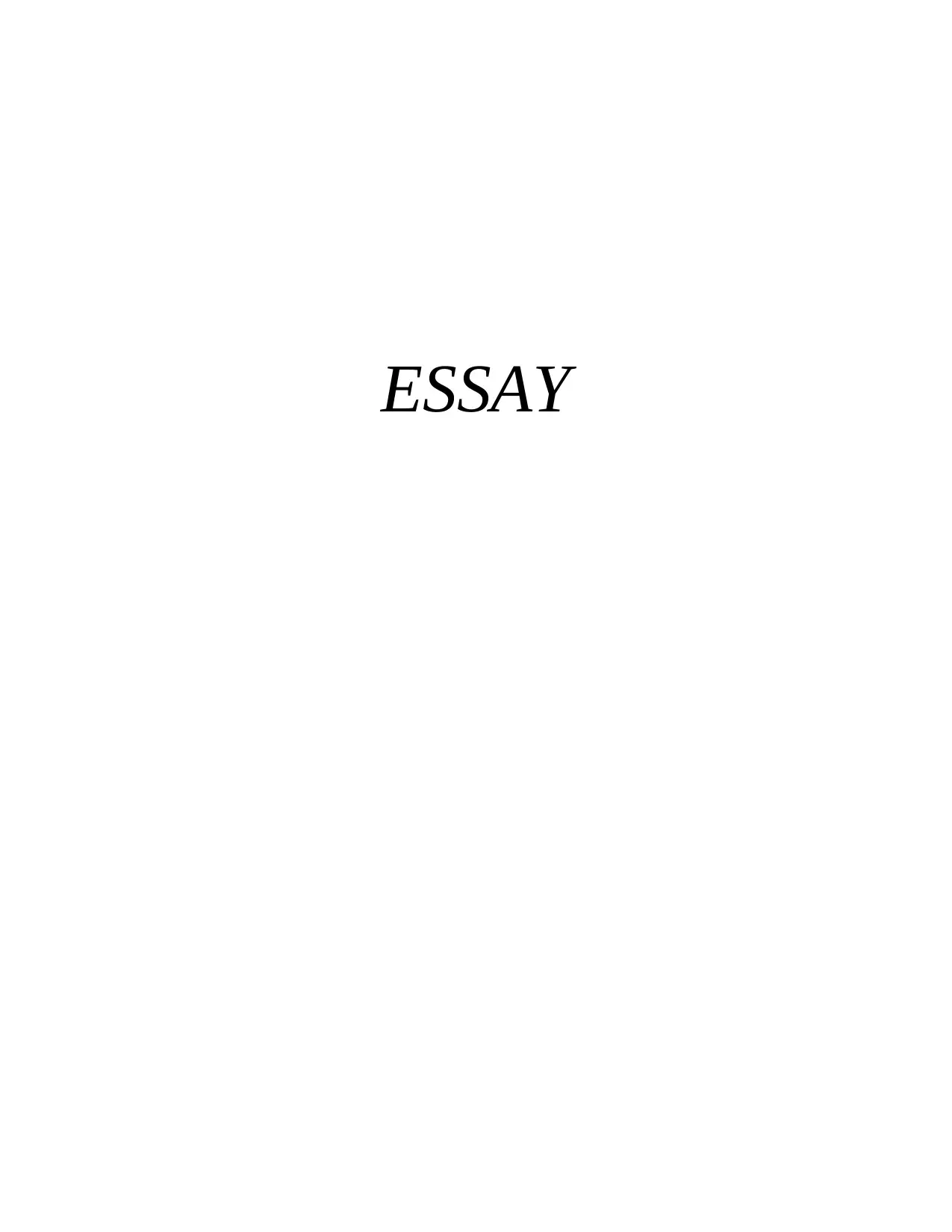
ESSAY
Paraphrase This Document
Need a fresh take? Get an instant paraphrase of this document with our AI Paraphraser
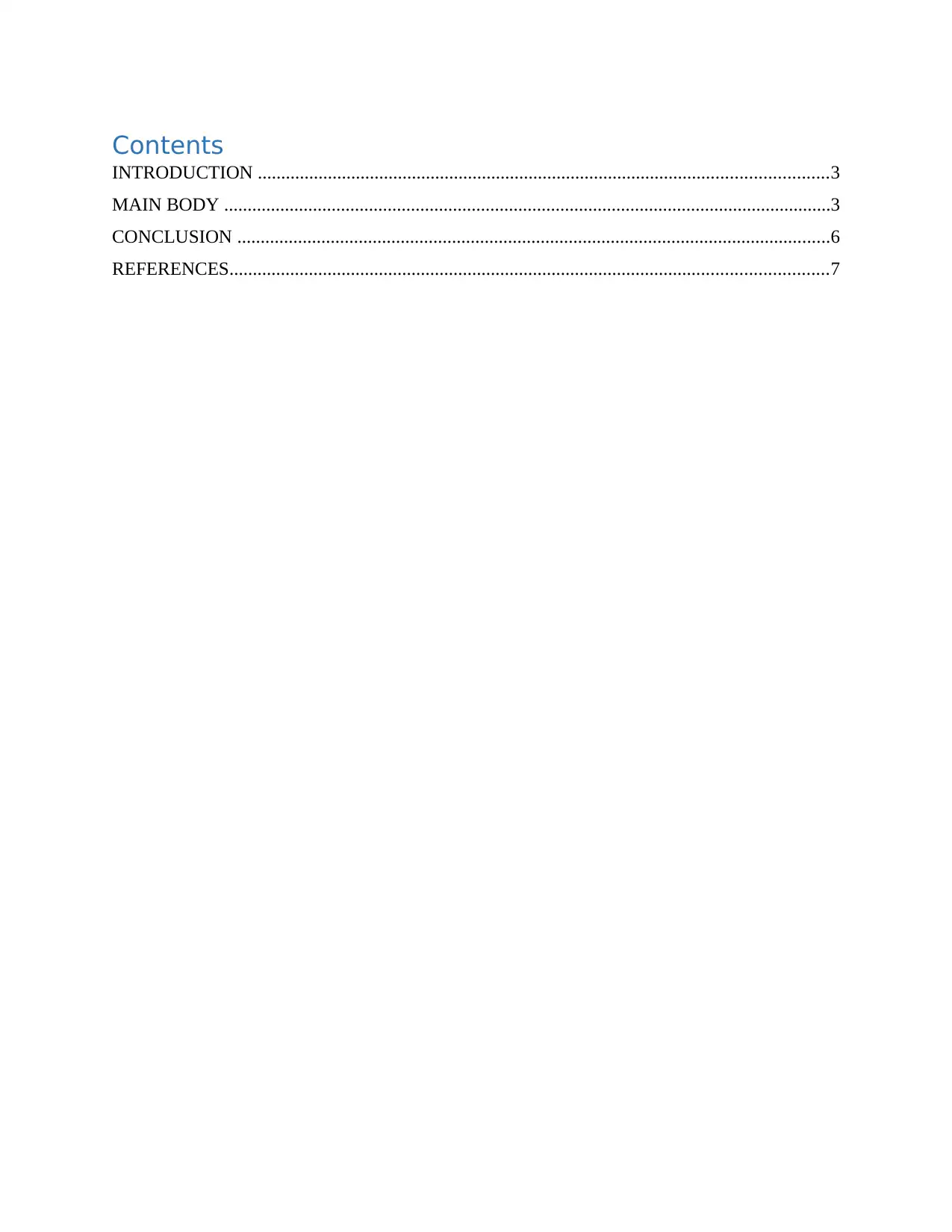
Contents
INTRODUCTION ..........................................................................................................................3
MAIN BODY ..................................................................................................................................3
CONCLUSION ...............................................................................................................................6
REFERENCES................................................................................................................................7
INTRODUCTION ..........................................................................................................................3
MAIN BODY ..................................................................................................................................3
CONCLUSION ...............................................................................................................................6
REFERENCES................................................................................................................................7
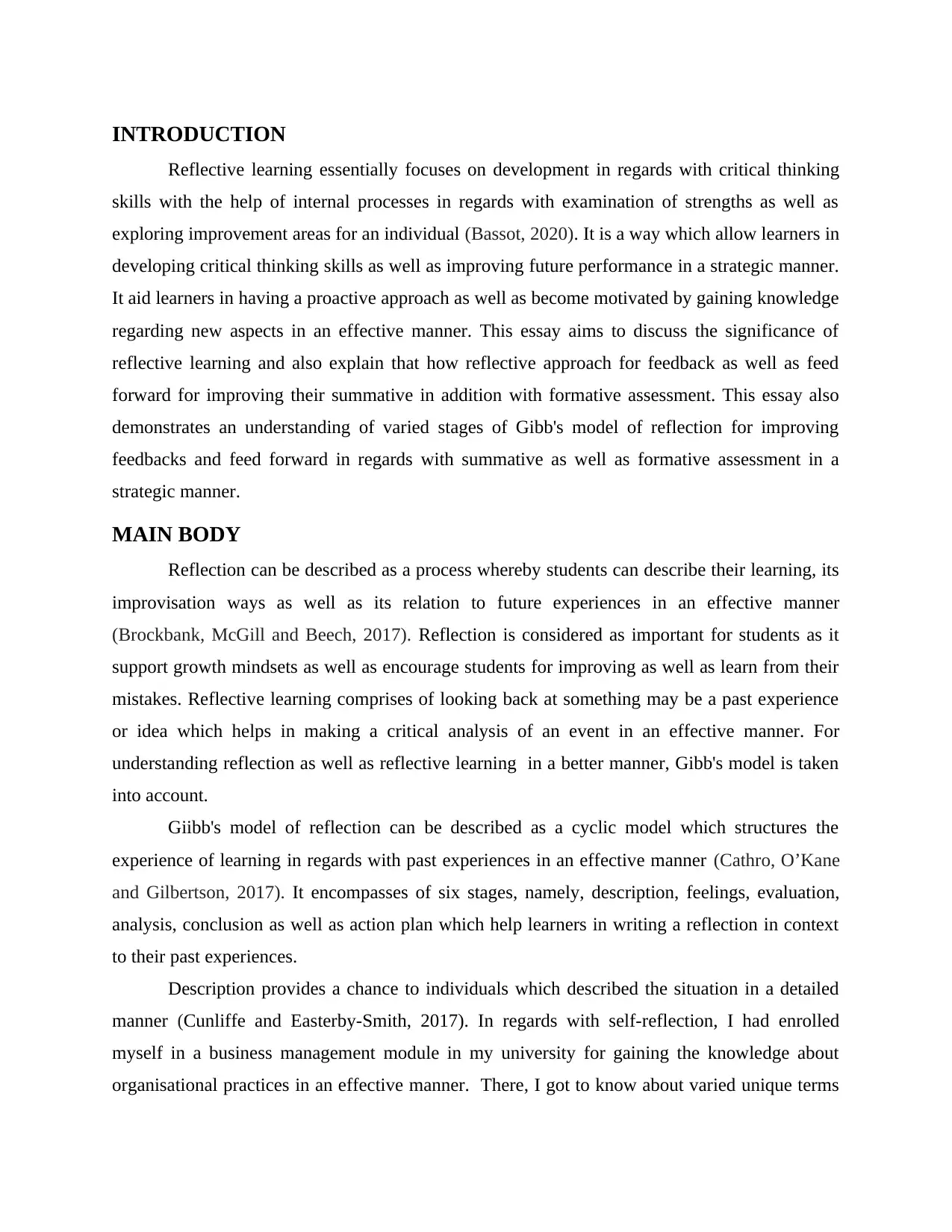
INTRODUCTION
Reflective learning essentially focuses on development in regards with critical thinking
skills with the help of internal processes in regards with examination of strengths as well as
exploring improvement areas for an individual (Bassot, 2020). It is a way which allow learners in
developing critical thinking skills as well as improving future performance in a strategic manner.
It aid learners in having a proactive approach as well as become motivated by gaining knowledge
regarding new aspects in an effective manner. This essay aims to discuss the significance of
reflective learning and also explain that how reflective approach for feedback as well as feed
forward for improving their summative in addition with formative assessment. This essay also
demonstrates an understanding of varied stages of Gibb's model of reflection for improving
feedbacks and feed forward in regards with summative as well as formative assessment in a
strategic manner.
MAIN BODY
Reflection can be described as a process whereby students can describe their learning, its
improvisation ways as well as its relation to future experiences in an effective manner
(Brockbank, McGill and Beech, 2017). Reflection is considered as important for students as it
support growth mindsets as well as encourage students for improving as well as learn from their
mistakes. Reflective learning comprises of looking back at something may be a past experience
or idea which helps in making a critical analysis of an event in an effective manner. For
understanding reflection as well as reflective learning in a better manner, Gibb's model is taken
into account.
Giibb's model of reflection can be described as a cyclic model which structures the
experience of learning in regards with past experiences in an effective manner (Cathro, O’Kane
and Gilbertson, 2017). It encompasses of six stages, namely, description, feelings, evaluation,
analysis, conclusion as well as action plan which help learners in writing a reflection in context
to their past experiences.
Description provides a chance to individuals which described the situation in a detailed
manner (Cunliffe and Easterby-Smith, 2017). In regards with self-reflection, I had enrolled
myself in a business management module in my university for gaining the knowledge about
organisational practices in an effective manner. There, I got to know about varied unique terms
Reflective learning essentially focuses on development in regards with critical thinking
skills with the help of internal processes in regards with examination of strengths as well as
exploring improvement areas for an individual (Bassot, 2020). It is a way which allow learners in
developing critical thinking skills as well as improving future performance in a strategic manner.
It aid learners in having a proactive approach as well as become motivated by gaining knowledge
regarding new aspects in an effective manner. This essay aims to discuss the significance of
reflective learning and also explain that how reflective approach for feedback as well as feed
forward for improving their summative in addition with formative assessment. This essay also
demonstrates an understanding of varied stages of Gibb's model of reflection for improving
feedbacks and feed forward in regards with summative as well as formative assessment in a
strategic manner.
MAIN BODY
Reflection can be described as a process whereby students can describe their learning, its
improvisation ways as well as its relation to future experiences in an effective manner
(Brockbank, McGill and Beech, 2017). Reflection is considered as important for students as it
support growth mindsets as well as encourage students for improving as well as learn from their
mistakes. Reflective learning comprises of looking back at something may be a past experience
or idea which helps in making a critical analysis of an event in an effective manner. For
understanding reflection as well as reflective learning in a better manner, Gibb's model is taken
into account.
Giibb's model of reflection can be described as a cyclic model which structures the
experience of learning in regards with past experiences in an effective manner (Cathro, O’Kane
and Gilbertson, 2017). It encompasses of six stages, namely, description, feelings, evaluation,
analysis, conclusion as well as action plan which help learners in writing a reflection in context
to their past experiences.
Description provides a chance to individuals which described the situation in a detailed
manner (Cunliffe and Easterby-Smith, 2017). In regards with self-reflection, I had enrolled
myself in a business management module in my university for gaining the knowledge about
organisational practices in an effective manner. There, I got to know about varied unique terms
⊘ This is a preview!⊘
Do you want full access?
Subscribe today to unlock all pages.

Trusted by 1+ million students worldwide
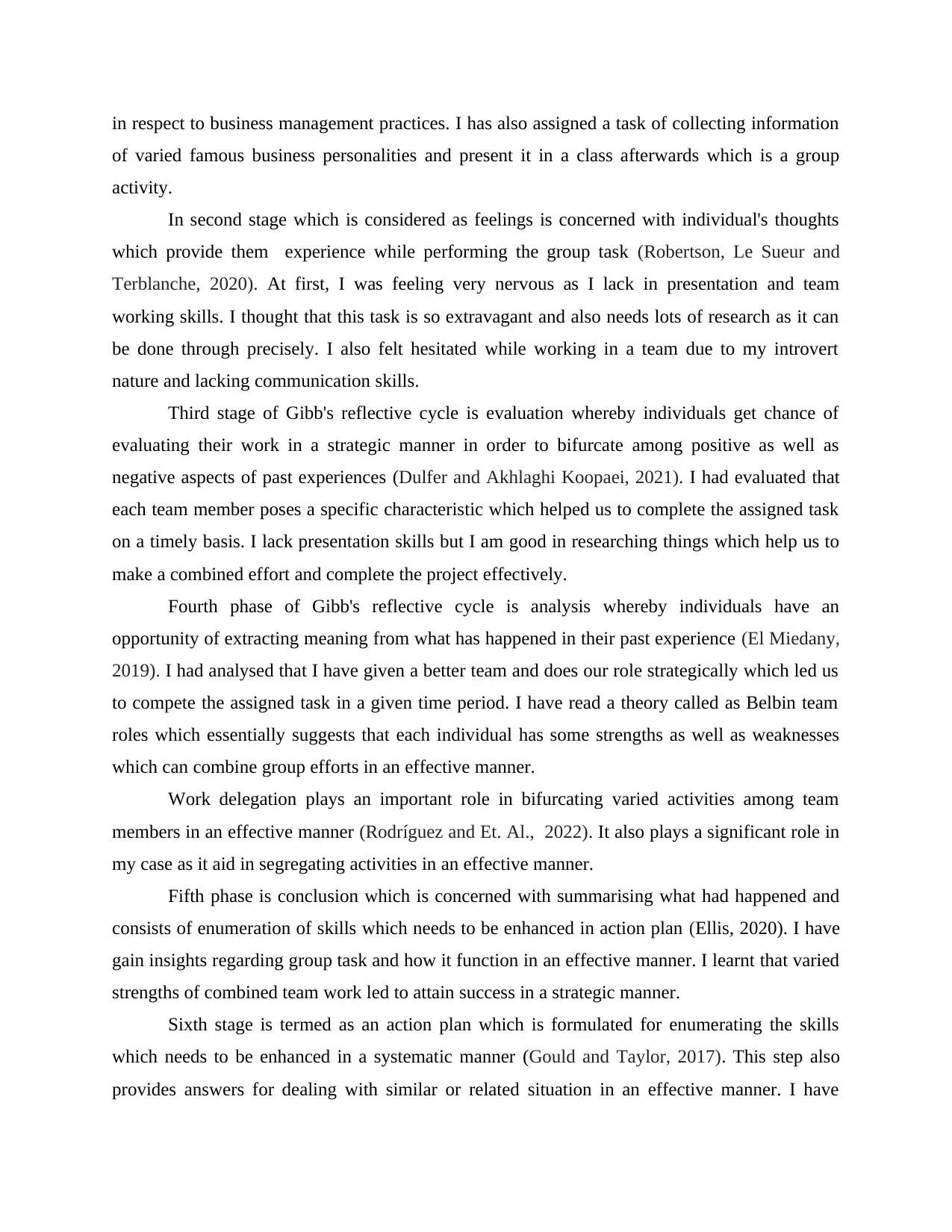
in respect to business management practices. I has also assigned a task of collecting information
of varied famous business personalities and present it in a class afterwards which is a group
activity.
In second stage which is considered as feelings is concerned with individual's thoughts
which provide them experience while performing the group task (Robertson, Le Sueur and
Terblanche, 2020). At first, I was feeling very nervous as I lack in presentation and team
working skills. I thought that this task is so extravagant and also needs lots of research as it can
be done through precisely. I also felt hesitated while working in a team due to my introvert
nature and lacking communication skills.
Third stage of Gibb's reflective cycle is evaluation whereby individuals get chance of
evaluating their work in a strategic manner in order to bifurcate among positive as well as
negative aspects of past experiences (Dulfer and Akhlaghi Koopaei, 2021). I had evaluated that
each team member poses a specific characteristic which helped us to complete the assigned task
on a timely basis. I lack presentation skills but I am good in researching things which help us to
make a combined effort and complete the project effectively.
Fourth phase of Gibb's reflective cycle is analysis whereby individuals have an
opportunity of extracting meaning from what has happened in their past experience (El Miedany,
2019). I had analysed that I have given a better team and does our role strategically which led us
to compete the assigned task in a given time period. I have read a theory called as Belbin team
roles which essentially suggests that each individual has some strengths as well as weaknesses
which can combine group efforts in an effective manner.
Work delegation plays an important role in bifurcating varied activities among team
members in an effective manner (Rodríguez and Et. Al., 2022). It also plays a significant role in
my case as it aid in segregating activities in an effective manner.
Fifth phase is conclusion which is concerned with summarising what had happened and
consists of enumeration of skills which needs to be enhanced in action plan (Ellis, 2020). I have
gain insights regarding group task and how it function in an effective manner. I learnt that varied
strengths of combined team work led to attain success in a strategic manner.
Sixth stage is termed as an action plan which is formulated for enumerating the skills
which needs to be enhanced in a systematic manner (Gould and Taylor, 2017). This step also
provides answers for dealing with similar or related situation in an effective manner. I have
of varied famous business personalities and present it in a class afterwards which is a group
activity.
In second stage which is considered as feelings is concerned with individual's thoughts
which provide them experience while performing the group task (Robertson, Le Sueur and
Terblanche, 2020). At first, I was feeling very nervous as I lack in presentation and team
working skills. I thought that this task is so extravagant and also needs lots of research as it can
be done through precisely. I also felt hesitated while working in a team due to my introvert
nature and lacking communication skills.
Third stage of Gibb's reflective cycle is evaluation whereby individuals get chance of
evaluating their work in a strategic manner in order to bifurcate among positive as well as
negative aspects of past experiences (Dulfer and Akhlaghi Koopaei, 2021). I had evaluated that
each team member poses a specific characteristic which helped us to complete the assigned task
on a timely basis. I lack presentation skills but I am good in researching things which help us to
make a combined effort and complete the project effectively.
Fourth phase of Gibb's reflective cycle is analysis whereby individuals have an
opportunity of extracting meaning from what has happened in their past experience (El Miedany,
2019). I had analysed that I have given a better team and does our role strategically which led us
to compete the assigned task in a given time period. I have read a theory called as Belbin team
roles which essentially suggests that each individual has some strengths as well as weaknesses
which can combine group efforts in an effective manner.
Work delegation plays an important role in bifurcating varied activities among team
members in an effective manner (Rodríguez and Et. Al., 2022). It also plays a significant role in
my case as it aid in segregating activities in an effective manner.
Fifth phase is conclusion which is concerned with summarising what had happened and
consists of enumeration of skills which needs to be enhanced in action plan (Ellis, 2020). I have
gain insights regarding group task and how it function in an effective manner. I learnt that varied
strengths of combined team work led to attain success in a strategic manner.
Sixth stage is termed as an action plan which is formulated for enumerating the skills
which needs to be enhanced in a systematic manner (Gould and Taylor, 2017). This step also
provides answers for dealing with similar or related situation in an effective manner. I have
Paraphrase This Document
Need a fresh take? Get an instant paraphrase of this document with our AI Paraphraser
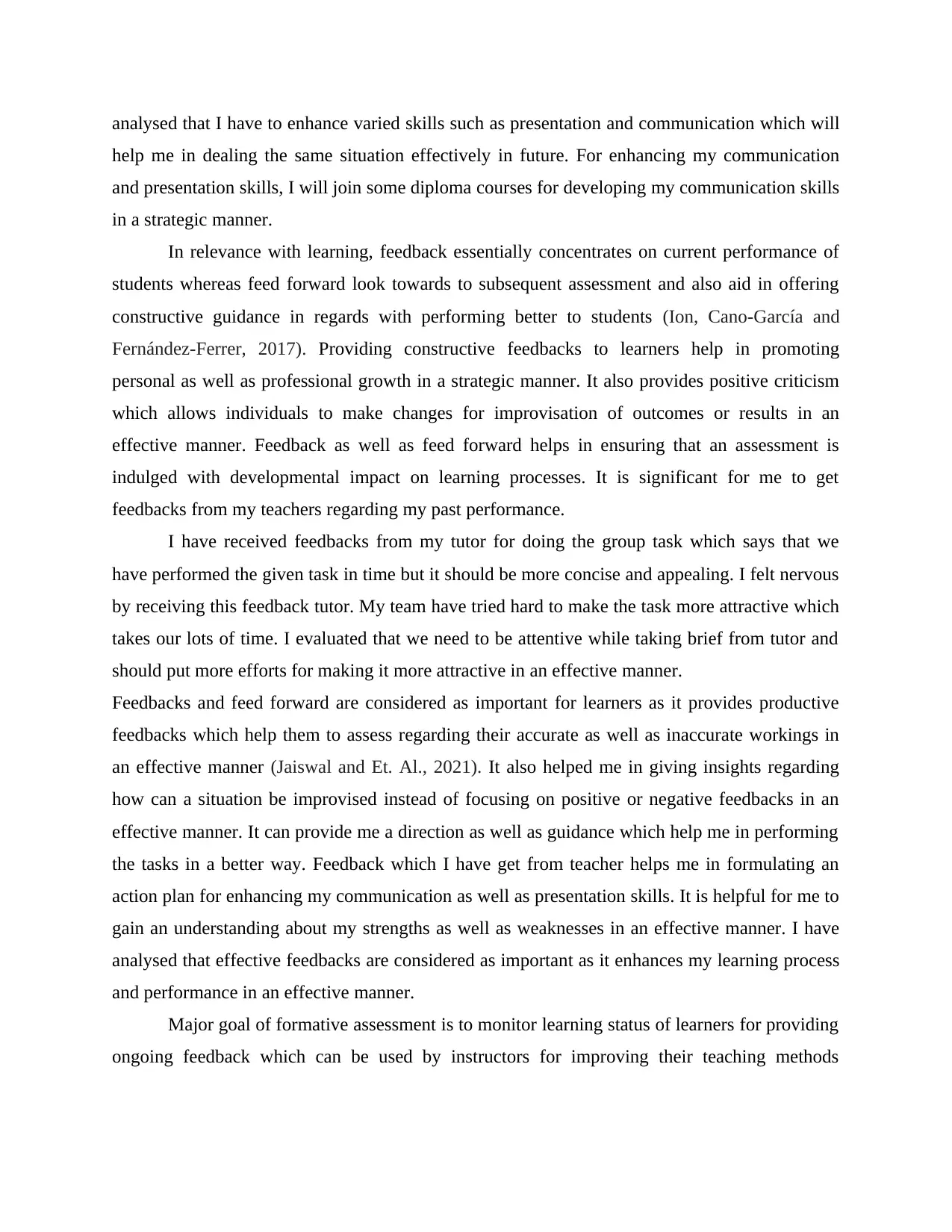
analysed that I have to enhance varied skills such as presentation and communication which will
help me in dealing the same situation effectively in future. For enhancing my communication
and presentation skills, I will join some diploma courses for developing my communication skills
in a strategic manner.
In relevance with learning, feedback essentially concentrates on current performance of
students whereas feed forward look towards to subsequent assessment and also aid in offering
constructive guidance in regards with performing better to students (Ion, Cano-García and
Fernández-Ferrer, 2017). Providing constructive feedbacks to learners help in promoting
personal as well as professional growth in a strategic manner. It also provides positive criticism
which allows individuals to make changes for improvisation of outcomes or results in an
effective manner. Feedback as well as feed forward helps in ensuring that an assessment is
indulged with developmental impact on learning processes. It is significant for me to get
feedbacks from my teachers regarding my past performance.
I have received feedbacks from my tutor for doing the group task which says that we
have performed the given task in time but it should be more concise and appealing. I felt nervous
by receiving this feedback tutor. My team have tried hard to make the task more attractive which
takes our lots of time. I evaluated that we need to be attentive while taking brief from tutor and
should put more efforts for making it more attractive in an effective manner.
Feedbacks and feed forward are considered as important for learners as it provides productive
feedbacks which help them to assess regarding their accurate as well as inaccurate workings in
an effective manner (Jaiswal and Et. Al., 2021). It also helped me in giving insights regarding
how can a situation be improvised instead of focusing on positive or negative feedbacks in an
effective manner. It can provide me a direction as well as guidance which help me in performing
the tasks in a better way. Feedback which I have get from teacher helps me in formulating an
action plan for enhancing my communication as well as presentation skills. It is helpful for me to
gain an understanding about my strengths as well as weaknesses in an effective manner. I have
analysed that effective feedbacks are considered as important as it enhances my learning process
and performance in an effective manner.
Major goal of formative assessment is to monitor learning status of learners for providing
ongoing feedback which can be used by instructors for improving their teaching methods
help me in dealing the same situation effectively in future. For enhancing my communication
and presentation skills, I will join some diploma courses for developing my communication skills
in a strategic manner.
In relevance with learning, feedback essentially concentrates on current performance of
students whereas feed forward look towards to subsequent assessment and also aid in offering
constructive guidance in regards with performing better to students (Ion, Cano-García and
Fernández-Ferrer, 2017). Providing constructive feedbacks to learners help in promoting
personal as well as professional growth in a strategic manner. It also provides positive criticism
which allows individuals to make changes for improvisation of outcomes or results in an
effective manner. Feedback as well as feed forward helps in ensuring that an assessment is
indulged with developmental impact on learning processes. It is significant for me to get
feedbacks from my teachers regarding my past performance.
I have received feedbacks from my tutor for doing the group task which says that we
have performed the given task in time but it should be more concise and appealing. I felt nervous
by receiving this feedback tutor. My team have tried hard to make the task more attractive which
takes our lots of time. I evaluated that we need to be attentive while taking brief from tutor and
should put more efforts for making it more attractive in an effective manner.
Feedbacks and feed forward are considered as important for learners as it provides productive
feedbacks which help them to assess regarding their accurate as well as inaccurate workings in
an effective manner (Jaiswal and Et. Al., 2021). It also helped me in giving insights regarding
how can a situation be improvised instead of focusing on positive or negative feedbacks in an
effective manner. It can provide me a direction as well as guidance which help me in performing
the tasks in a better way. Feedback which I have get from teacher helps me in formulating an
action plan for enhancing my communication as well as presentation skills. It is helpful for me to
gain an understanding about my strengths as well as weaknesses in an effective manner. I have
analysed that effective feedbacks are considered as important as it enhances my learning process
and performance in an effective manner.
Major goal of formative assessment is to monitor learning status of learners for providing
ongoing feedback which can be used by instructors for improving their teaching methods
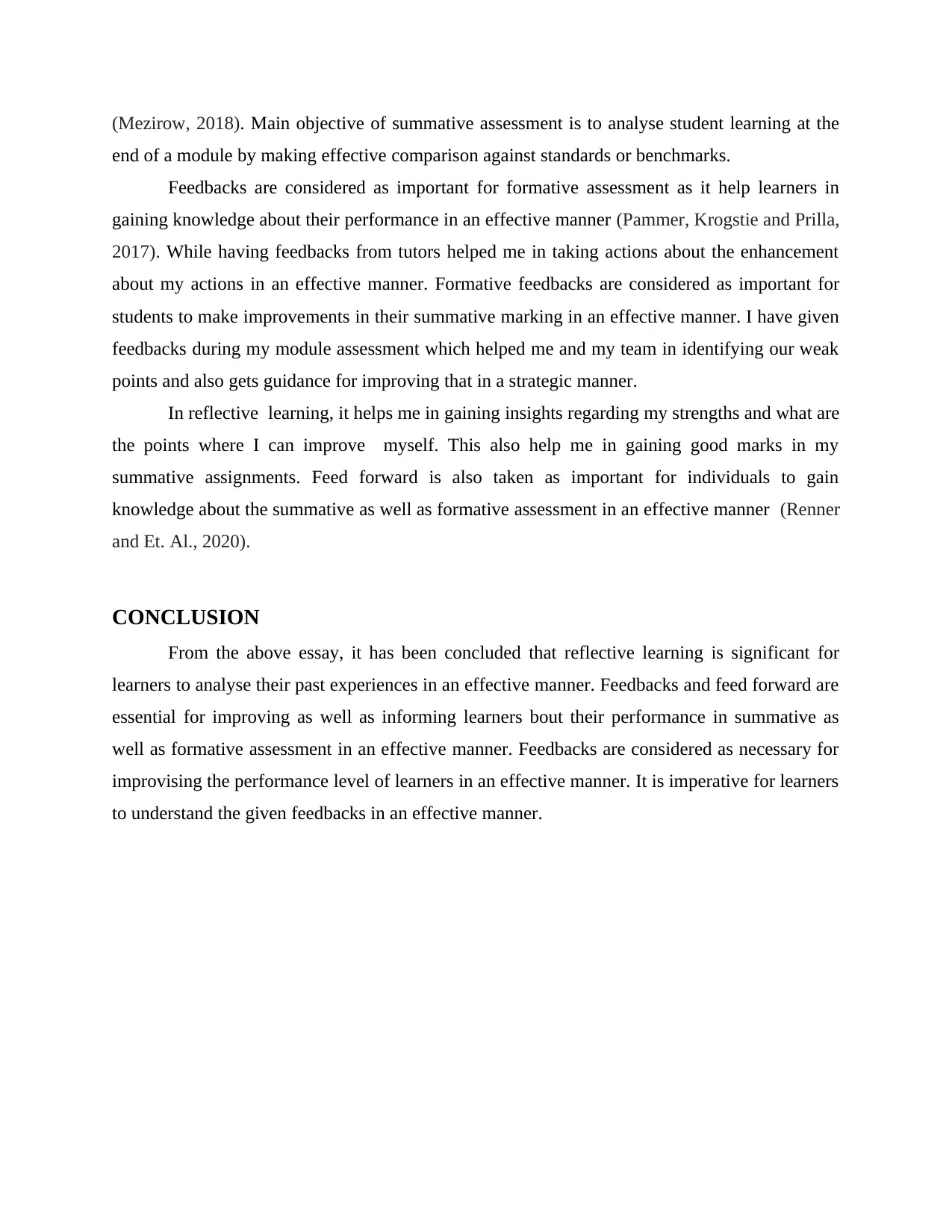
(Mezirow, 2018). Main objective of summative assessment is to analyse student learning at the
end of a module by making effective comparison against standards or benchmarks.
Feedbacks are considered as important for formative assessment as it help learners in
gaining knowledge about their performance in an effective manner (Pammer, Krogstie and Prilla,
2017). While having feedbacks from tutors helped me in taking actions about the enhancement
about my actions in an effective manner. Formative feedbacks are considered as important for
students to make improvements in their summative marking in an effective manner. I have given
feedbacks during my module assessment which helped me and my team in identifying our weak
points and also gets guidance for improving that in a strategic manner.
In reflective learning, it helps me in gaining insights regarding my strengths and what are
the points where I can improve myself. This also help me in gaining good marks in my
summative assignments. Feed forward is also taken as important for individuals to gain
knowledge about the summative as well as formative assessment in an effective manner (Renner
and Et. Al., 2020).
CONCLUSION
From the above essay, it has been concluded that reflective learning is significant for
learners to analyse their past experiences in an effective manner. Feedbacks and feed forward are
essential for improving as well as informing learners bout their performance in summative as
well as formative assessment in an effective manner. Feedbacks are considered as necessary for
improvising the performance level of learners in an effective manner. It is imperative for learners
to understand the given feedbacks in an effective manner.
end of a module by making effective comparison against standards or benchmarks.
Feedbacks are considered as important for formative assessment as it help learners in
gaining knowledge about their performance in an effective manner (Pammer, Krogstie and Prilla,
2017). While having feedbacks from tutors helped me in taking actions about the enhancement
about my actions in an effective manner. Formative feedbacks are considered as important for
students to make improvements in their summative marking in an effective manner. I have given
feedbacks during my module assessment which helped me and my team in identifying our weak
points and also gets guidance for improving that in a strategic manner.
In reflective learning, it helps me in gaining insights regarding my strengths and what are
the points where I can improve myself. This also help me in gaining good marks in my
summative assignments. Feed forward is also taken as important for individuals to gain
knowledge about the summative as well as formative assessment in an effective manner (Renner
and Et. Al., 2020).
CONCLUSION
From the above essay, it has been concluded that reflective learning is significant for
learners to analyse their past experiences in an effective manner. Feedbacks and feed forward are
essential for improving as well as informing learners bout their performance in summative as
well as formative assessment in an effective manner. Feedbacks are considered as necessary for
improvising the performance level of learners in an effective manner. It is imperative for learners
to understand the given feedbacks in an effective manner.
⊘ This is a preview!⊘
Do you want full access?
Subscribe today to unlock all pages.

Trusted by 1+ million students worldwide
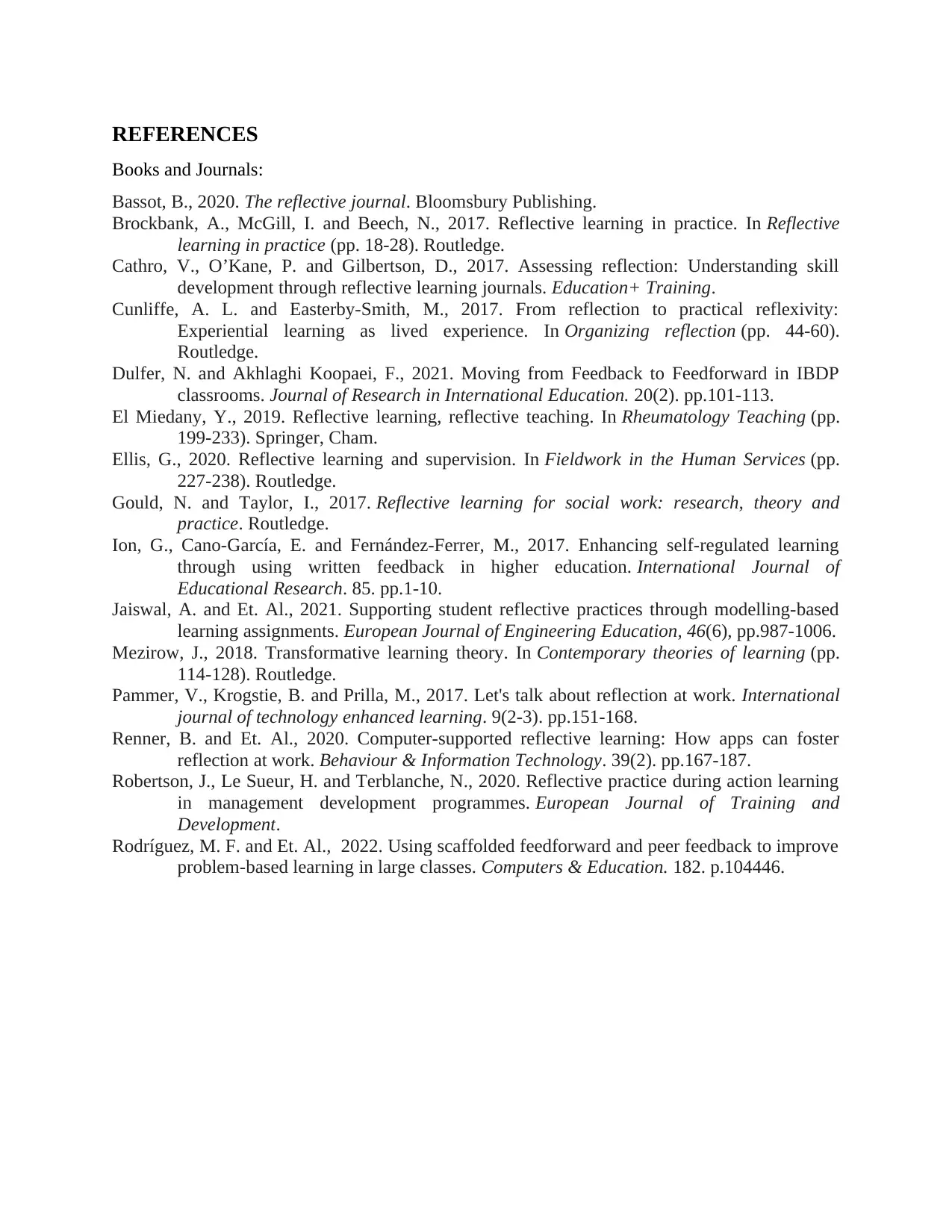
REFERENCES
Books and Journals:
Bassot, B., 2020. The reflective journal. Bloomsbury Publishing.
Brockbank, A., McGill, I. and Beech, N., 2017. Reflective learning in practice. In Reflective
learning in practice (pp. 18-28). Routledge.
Cathro, V., O’Kane, P. and Gilbertson, D., 2017. Assessing reflection: Understanding skill
development through reflective learning journals. Education+ Training.
Cunliffe, A. L. and Easterby-Smith, M., 2017. From reflection to practical reflexivity:
Experiential learning as lived experience. In Organizing reflection (pp. 44-60).
Routledge.
Dulfer, N. and Akhlaghi Koopaei, F., 2021. Moving from Feedback to Feedforward in IBDP
classrooms. Journal of Research in International Education. 20(2). pp.101-113.
El Miedany, Y., 2019. Reflective learning, reflective teaching. In Rheumatology Teaching (pp.
199-233). Springer, Cham.
Ellis, G., 2020. Reflective learning and supervision. In Fieldwork in the Human Services (pp.
227-238). Routledge.
Gould, N. and Taylor, I., 2017. Reflective learning for social work: research, theory and
practice. Routledge.
Ion, G., Cano-García, E. and Fernández-Ferrer, M., 2017. Enhancing self-regulated learning
through using written feedback in higher education. International Journal of
Educational Research. 85. pp.1-10.
Jaiswal, A. and Et. Al., 2021. Supporting student reflective practices through modelling-based
learning assignments. European Journal of Engineering Education, 46(6), pp.987-1006.
Mezirow, J., 2018. Transformative learning theory. In Contemporary theories of learning (pp.
114-128). Routledge.
Pammer, V., Krogstie, B. and Prilla, M., 2017. Let's talk about reflection at work. International
journal of technology enhanced learning. 9(2-3). pp.151-168.
Renner, B. and Et. Al., 2020. Computer-supported reflective learning: How apps can foster
reflection at work. Behaviour & Information Technology. 39(2). pp.167-187.
Robertson, J., Le Sueur, H. and Terblanche, N., 2020. Reflective practice during action learning
in management development programmes. European Journal of Training and
Development.
Rodríguez, M. F. and Et. Al., 2022. Using scaffolded feedforward and peer feedback to improve
problem-based learning in large classes. Computers & Education. 182. p.104446.
Books and Journals:
Bassot, B., 2020. The reflective journal. Bloomsbury Publishing.
Brockbank, A., McGill, I. and Beech, N., 2017. Reflective learning in practice. In Reflective
learning in practice (pp. 18-28). Routledge.
Cathro, V., O’Kane, P. and Gilbertson, D., 2017. Assessing reflection: Understanding skill
development through reflective learning journals. Education+ Training.
Cunliffe, A. L. and Easterby-Smith, M., 2017. From reflection to practical reflexivity:
Experiential learning as lived experience. In Organizing reflection (pp. 44-60).
Routledge.
Dulfer, N. and Akhlaghi Koopaei, F., 2021. Moving from Feedback to Feedforward in IBDP
classrooms. Journal of Research in International Education. 20(2). pp.101-113.
El Miedany, Y., 2019. Reflective learning, reflective teaching. In Rheumatology Teaching (pp.
199-233). Springer, Cham.
Ellis, G., 2020. Reflective learning and supervision. In Fieldwork in the Human Services (pp.
227-238). Routledge.
Gould, N. and Taylor, I., 2017. Reflective learning for social work: research, theory and
practice. Routledge.
Ion, G., Cano-García, E. and Fernández-Ferrer, M., 2017. Enhancing self-regulated learning
through using written feedback in higher education. International Journal of
Educational Research. 85. pp.1-10.
Jaiswal, A. and Et. Al., 2021. Supporting student reflective practices through modelling-based
learning assignments. European Journal of Engineering Education, 46(6), pp.987-1006.
Mezirow, J., 2018. Transformative learning theory. In Contemporary theories of learning (pp.
114-128). Routledge.
Pammer, V., Krogstie, B. and Prilla, M., 2017. Let's talk about reflection at work. International
journal of technology enhanced learning. 9(2-3). pp.151-168.
Renner, B. and Et. Al., 2020. Computer-supported reflective learning: How apps can foster
reflection at work. Behaviour & Information Technology. 39(2). pp.167-187.
Robertson, J., Le Sueur, H. and Terblanche, N., 2020. Reflective practice during action learning
in management development programmes. European Journal of Training and
Development.
Rodríguez, M. F. and Et. Al., 2022. Using scaffolded feedforward and peer feedback to improve
problem-based learning in large classes. Computers & Education. 182. p.104446.
1 out of 7
Related Documents
Your All-in-One AI-Powered Toolkit for Academic Success.
+13062052269
info@desklib.com
Available 24*7 on WhatsApp / Email
![[object Object]](/_next/static/media/star-bottom.7253800d.svg)
Unlock your academic potential
Copyright © 2020–2026 A2Z Services. All Rights Reserved. Developed and managed by ZUCOL.



